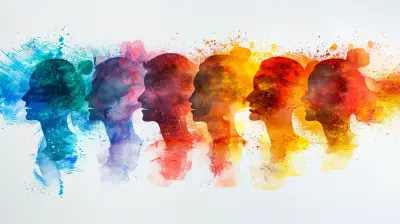How to Be a Mental Health Advocate in a Stigmatizing World
19 June 2025
Let’s be honest—talking about mental health still makes a lot of people squirm. Despite all the progress we've made, society hasn't quite shaken off the discomfort that comes with mental health discussions. The stigma still breathes through whispers, judgmental glances, and uncomfortable silences. But you? You're here because you want to change that.
Being a mental health advocate isn’t about shouting from the rooftops (though sometimes that helps). It’s about empathy, small consistent actions, and yes, courage. It’s about being a voice when others are too afraid to speak.
Let’s break it all down—what it means to be a mental health advocate, why it matters, and how you can step into that role, even if the world around you doesn’t always understand.
What Does It Mean to Be a Mental Health Advocate?
Think of advocacy like being a bridge between silence and support. A mental health advocate raises awareness, offers support, and pushes back against stigma. And no, you don’t need a psychology degree or millions of followers to qualify. If you care deeply, you're already partway there.You can advocate for mental health by:
- Sharing your own story (if you feel safe to do so)
- Supporting others who are struggling
- Educating people around you
- Holding institutions accountable
- Promoting healthy mental habits
It’s less about being perfect and more about being present.
Why Is Mental Health Advocacy So Important?
Ever noticed how people will openly talk about a cold or broken arm but whisper about anxiety or depression? That’s stigma in action. And that silence? It’s dangerous.Mental health issues affect one in four people globally. Yet, many suffer in silence because they’re terrified of being labeled, judged, or ostracized. Stigma leads to shame. Shame leads to silence. And silence can be deadly.
That’s where advocates come in—we break the cycle.
Common Misconceptions That Fuel Stigma
Before we dive into how to advocate effectively, it's important to understand the myths that you're up against. These misconceptions aren’t just annoying—they’re harmful.“Mental illness isn’t real.”
False. Mental health conditions are just as real as physical illnesses. The brain is an organ like any other—it can get sick, and it deserves treatment.“People with mental illness are dangerous.”
This is one of the most damaging stereotypes out there. In reality, those with mental health conditions are far more likely to be victims of violence than perpetrators.“They’re just being dramatic.”
Mental illnesses aren’t character flaws or mood swings. They’re complex, often invisible battles that deserve validation and understanding.Recognizing these myths is step one. Challenging them? That’s where advocacy begins.
How to Be a Mental Health Advocate in a Stigmatizing World
So, how do you show up, speak out, and help drive much-needed change? Here’s your roadmap.1. Start with Yourself
Let’s be real: You can’t pour from an empty cup. Before you charge into advocacy mode, check in with yourself. Are you taking care of your own mental health? Are you working through your own biases or stigmas?Self-awareness is the foundation. Advocacy built on burnout helps no one.
> Think of yourself as both a warrior and a wellspring—fighting the good fight but staying replenished along the way.
2. Use Your Voice… Even If It Trembles
Sharing your story isn’t mandatory, but if you’re comfortable doing so, it can be powerful. Personal stories put a human face to mental health struggles. They turn abstract concepts into lived experience.You don’t need to shout into a megaphone. Whether it’s a blog post, a casual conversation, or a social media post, your voice matters.
And if you’re not ready to share your own story? Amplify someone else’s. Retweet that mental health post. Share that suicide prevention link. Little actions pack a punch.
3. Call Out Stigma When You See It
Ever sat in an office where someone made a joke about being “bipolar” on a bad day? Or heard someone describe a murderer as “crazy” in casual conversation? Stigmatizing language is everywhere.Be that person who gently (but firmly) corrects them.
> "Hey, I know you didn’t mean anything by it, but using 'crazy' that way can be pretty harmful—it reinforces a lot of negative stereotypes."
Sure, it may feel uncomfortable. But discomfort is where growth begins. And your courage may give others permission to speak up too.
4. Make Mental Health Part of Everyday Conversation
Normalize it. Talk about mental health the same way we talk about physical health. Ask your friends, “How’s your mental health been lately?” just like you would ask about their job or relationship.The more we talk about it, the less taboo it becomes.
And guess what? Your willingness to chat openly might be the signal someone else needs to finally ask for help.
5. Educate Yourself (And Others)
You don’t need to be a therapist to understand mental health. But the more informed you are, the stronger your advocacy becomes.Read books, attend workshops, follow credible mental health pages, watch documentaries. Keep learning.
Then, share what you learn. Forward that helpful article. Recommend that insightful podcast. Host a book club on mental health themes.
When knowledge circulates, so does compassion.
6. Support Mental Health Organizations
You don’t have to start your own movement. Plenty of organizations are already doing incredible work—you can join forces with them.Volunteer. Donate. Attend events. Share their resources. Every bit helps.
Some global organizations doing impactful work:
- National Alliance on Mental Illness (NAMI)
- Mental Health America
- Mind (UK)
- The Trevor Project
- Active Minds
Find one that aligns with your values and dive in.
7. Push for Policy Change
Mental health advocacy isn’t just personal—it’s political.Whether it’s advocating for better school counseling, more affordable treatment, or paid mental health days, use your voice to demand change.
Write to your legislators. Sign petitions. Vote with mental health in mind.
Policy might seem boring, but it’s one of the most effective ways to create long-term change.
8. Be There—Really Be There—for People
Sometimes advocacy is just showing up. It’s checking in on a friend going through a tough time. It’s sitting in silence with someone who doesn’t have the words. It’s holding space without judgment.No grand gestures. Just a steady, compassionate presence.
You don’t need to “fix” anyone. Just be in their corner.
9. Keep Showing Up, Even on the Hard Days
This isn’t easy work. You’ll face resistance. You’ll get tired. You’ll wonder if your efforts matter.Spoiler: They do.
Change doesn’t happen overnight, and it sure doesn’t happen alone. But every conversation, every act of kindness, every truth spoken—it all adds up.
Advocacy is a marathon. So pace yourself. And remember why you started.
What If You're Still Struggling Yourself?
You might be thinking, “How can I advocate for others when I’m barely holding it together myself?”Honestly? That makes you the perfect person to advocate. Lived experience brings honesty, depth, and compassion that can’t be faked.
You don’t have to be “fully healed” or have it all figured out. None of us do. Sometimes the most powerful advocacy is simply saying, “Me too.”
> Your struggle doesn’t disqualify you—it qualifies you.
Final Thoughts
The world may still carry the weight of stigma, but that doesn’t mean we have to accept it. Each of us has the power to shift the narrative around mental health, one moment of courage at a time.So keep talking. Keep listening. Keep showing up.
Because someone out there is still afraid to speak—and your voice might be the one that sets them free.
all images in this post were generated using AI tools
Category:
Mental Health StigmaAuthor:

Ember Forbes
Discussion
rate this article
2 comments
Lyanna White
Being a mental health advocate is like being a superhero—no cape needed! Let’s break stigma with kindness, spark conversations, and spread mental wellness like confetti!" 🎉
June 19, 2025 at 5:05 PM

Ember Forbes
Absolutely! Advocating for mental health empowers us to create positive change through compassion and open dialogue. Together, we can transform stigma into support! 🌈
Carly McFarlin
In a world where stigma often silences, your voice can be a beacon of hope. Stand bold, share your story, and educate others. Every conversation breaks down barriers. Together, we can create a culture of understanding, support, and compassion. Be the change—advocate for mental health!
June 19, 2025 at 2:51 AM

Ember Forbes
Thank you for your inspiring words! Every voice matters in the fight against stigma, and together, we can foster understanding and support for mental health. Let's keep the conversation going!


